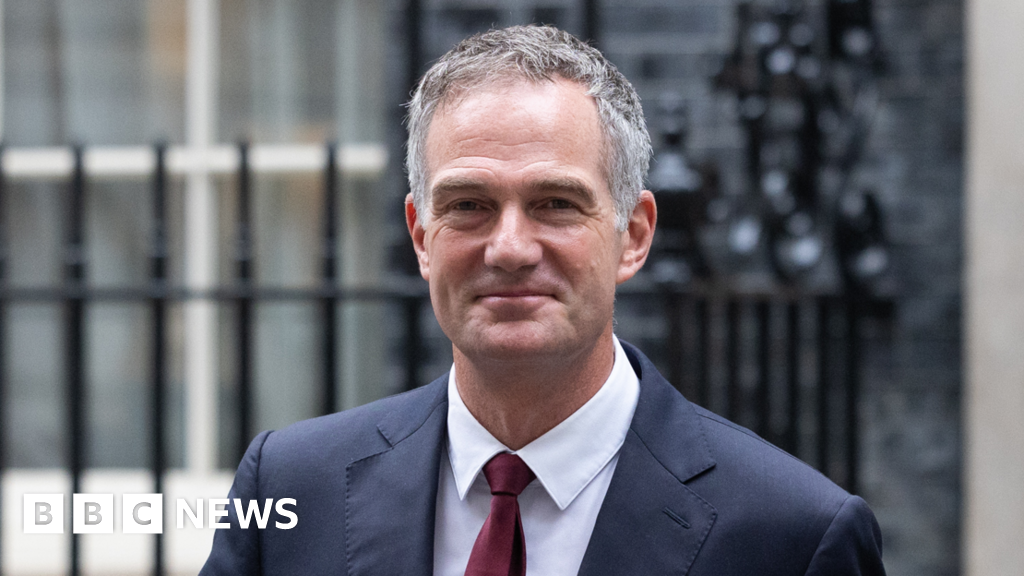Business
UK’s Turing AI Institute bosses respond to staff anger

The heads of the UK’s national institute for artificial intelligence (AI) have acknowledged recent months have been “challenging” for staff as the charity undergoes “substantial” change.
It comes after staff raised “serious and escalating concerns” in a whistleblowing complaint this week submitted to the Charity Commission.
They warned that the body – which receives £100m from the government – is at risk of collapse after Technology Secretary Peter Kyle instructed it to prioritise defence, and threatened to pull its funding if it did not.
In a letter seen by the BBC, Chair Dr Doug Gurr said the Turing Institute would “step up at a time of national need”.
He said it had already established a new senior working group comprising government officials and Turing institute staff.
However he said defence should not be the “sole focus” and some work on healthcare and environmental issues would continue in line with the aims of both the government and private investors.
Whistleblowers have described the management’s response as “performative”.
“Just talk, no action, nothing has changed,” they said, speaking to the BBC on condition of anonymity because they fear losing their jobs for speaking out.
Dr Gurr and Chief Executive Dr Jean Innes did not respond directly to accusations by the whistleblowers about a toxic internal culture of “retaliation” and “defensiveness”.
The pair said they had not seen the letter sent from whistleblowers to the Charity Commission, which has been shared with the BBC.
“We are committed to conducting our business with honesty, integrity and transparency and believe that a culture of openness and accountability is essential,” they wrote, and linked to the Turing institute’s whistleblowing guidelines.
Founded in 2015 as the UK’s leading centre of AI research, the Turing institute, which is headquartered at the British Library in London, has been rocked by internal discontent and criticism of its research activities.
The shift to focusing on defence represents a significant pivot for the publicly funded organisation.
Both the whistleblowers and the technology secretary have said they want new leaders at the Institute – but there was no mention of any change in the management team in the letter.
A number of senior staff have left the organisation in recent months, and bosses said more people would either be made redundant or not have their contracts renewed as the restructure continues.
Business
Imperfect AI creates more editing business opportunities – DIGITIMES Asia
Business
OpenAI forecasts $115 billion business spend on AI rollout by 2029

OpenAI has elevated its cash burn forecast this year through 2029 to a total of $115 billion. The company’s recent cash burn expectation is also $80 billion higher than it previously projected.
According to a report by The Information, the surge in cash burn for OpenAI comes at a time when it’s ramping up spending to power the artificial intelligence behind its popular ChatGPT chatbot. The tech firm has also become one of the world’s biggest renters of cloud services.
OpenAI plans to develop its chips and data center facilities
The source revealed that the AI company expects to burn over $8 billion this year. OpenAI had forecasted early in the year that it would only burn around $1.5 billion.
According to the report, OpenAI doubled its cash burn expectations for 2026 to more than $17 billion, surpassing its previous forecast of $10 billion. The firm also projects a $35 billion cash burn in 2027 and $45 billion in 2028.
The FT also disclosed on Thursday that the Silicon Valley startup plans to develop its data center server chips and facilities to power its technology. According to the report, the initiative aims to control the tech company’s surging operational costs.
The firm relies on substantial computing power to train and run its systems. The company’s CEO, Sam Altman, has also advocated the need for increased computing power to accommodate the growing demand for AI products such as ChatGPT.
Deloitte’s 2025 AI infrastructure Survey revealed that the energy demands of AI are straining traditional power grids. According to the study, 79% of executives anticipate increased power demand through the next decade, with grid stress emerging as a top challenge.
The source added that U.S. semiconductor giant Broadcom will partner with OpenAI to produce the first set of chips and start shipping them by next year. Also, OpenAI allegedly plans to use the chips internally rather than selling them for external clients.
Broadcom’s CEO, Hock Tan, hinted the company had partnered with an undisclosed customer that committed to $10 billion in orders. During a call with analysts, he revealed the firm had secured a fourth customer to boost its custom AI chip division. Tan stated the collaboration with OpenAI has enhanced its growth outlook for fiscal 2026 by generating immediate and substantial demand.
OpenAI partners with Broadcom to produce chips
OpenAI also partnered with Broadcom and Taiwan Semiconductor Manufacturing Co. (TSMC) nearly a year ago to develop its first in-house chip. The firm was also planning to add AMD chips alongside Nvidia chips to meet its surging infrastructure demands.
OpenAI revealed in February plans to reduce its reliance on Nvidia’s chips. The firm said it will finalize the design of the new chip in the next few months and then send it to TSMC for fabrication. OpenAI’s initiative also builds on its ambitious plans to increase its semiconductor production at the Taiwanese company next year.
According to the report, OpenAI hopes to use the new chips to strengthen its negotiating leverage with other chip suppliers, including Nvidia. The company’s in-house team, led by Richard Ho, will design the chip to produce advanced processors with broader capabilities with each new iteration.
OpenAI collaborated with Oracle in July to launch a 4.5-gigawatt data center. The initiative also complements the firm’s $500 billion Stargate project, including investments from Japanese firm SoftBank Group. The tech giant has also collaborated with Google Cloud to supply computing capacity.
Get $50 free to trade crypto when you sign up to Bybit now
Business
AI company Anthropic to pay authors $1.5 billion in landmark settlement

Big numbers often get thrown around in the aftermath of legal battles, as judges hand down judgements—or attorneys arrange settlement amounts—in the tens, or hundreds, of millions of dollars. Still, even jaded legal observers can occasionally run into a genuinely daunting number while parsing this stuff. Like, say, the $1.5 billion settlement that AI company Anthropic has agreed to pay in the ongoing class-action suit against it, launched by authors who said the company infringed on their copyrighted works by feeding them as training data to its “AI assistant” Claude. Sure, parts of that sum (calculated at $3,000 per work for a staggering number of works, and with its first $300 million installment due just five days after the settlement is approved) might potentially vanish in a puff of future bankruptcy. But it’s still the “largest publicly reported copyright recovery in history,” according to legal documents from the authors’ attorneys.
-

 Business1 week ago
Business1 week agoThe Guardian view on Trump and the Fed: independence is no substitute for accountability | Editorial
-
Tools & Platforms4 weeks ago
Building Trust in Military AI Starts with Opening the Black Box – War on the Rocks
-

 Ethics & Policy1 month ago
Ethics & Policy1 month agoSDAIA Supports Saudi Arabia’s Leadership in Shaping Global AI Ethics, Policy, and Research – وكالة الأنباء السعودية
-

 Events & Conferences4 months ago
Events & Conferences4 months agoJourney to 1000 models: Scaling Instagram’s recommendation system
-

 Jobs & Careers2 months ago
Jobs & Careers2 months agoMumbai-based Perplexity Alternative Has 60k+ Users Without Funding
-

 Education2 months ago
Education2 months agoVEX Robotics launches AI-powered classroom robotics system
-

 Podcasts & Talks2 months ago
Podcasts & Talks2 months agoHappy 4th of July! 🎆 Made with Veo 3 in Gemini
-

 Funding & Business2 months ago
Funding & Business2 months agoKayak and Expedia race to build AI travel agents that turn social posts into itineraries
-

 Education2 months ago
Education2 months agoMacron says UK and France have duty to tackle illegal migration ‘with humanity, solidarity and firmness’ – UK politics live | Politics
-

 Podcasts & Talks2 months ago
Podcasts & Talks2 months agoOpenAI 🤝 @teamganassi


